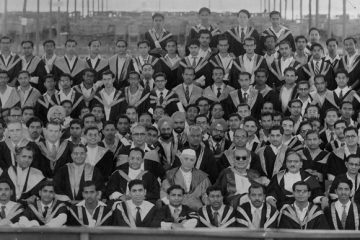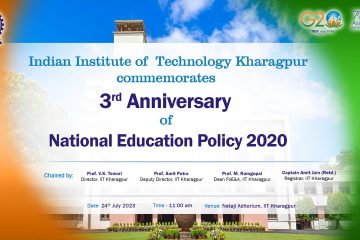 Two back-to-back workshops organized by the Bioprocess & Bioproduct Development Laboratory (PI: Prof. Ramkrishna Sen) of the Department of Biotechnology, IIT Kharagpur along with the collaborators from USA and Australia from January 2-5, 2020 under the Government of India’s Scheme for Promotion of Academic and Research Collaboration (SPARC) brought to students latest news on how the scientific community the world over is bracing up for a future that will see biofuels replace petroleum and green technologies being employed in a world that is seeing the steady depletion of natural resources. The bottom-line of both the workshops were the pursuit of new technologies for a sustainable future.
Two back-to-back workshops organized by the Bioprocess & Bioproduct Development Laboratory (PI: Prof. Ramkrishna Sen) of the Department of Biotechnology, IIT Kharagpur along with the collaborators from USA and Australia from January 2-5, 2020 under the Government of India’s Scheme for Promotion of Academic and Research Collaboration (SPARC) brought to students latest news on how the scientific community the world over is bracing up for a future that will see biofuels replace petroleum and green technologies being employed in a world that is seeing the steady depletion of natural resources. The bottom-line of both the workshops were the pursuit of new technologies for a sustainable future.

“We are presently living in a linear economy, where we ‘take, make and throw’. But this is a cradle-to-grave attitude. We have to move towards a circular economy, where producing energy from biogenic waste will play a significant role,” said the S. S. Bhatnagar awardee, Dr. S. Venkata Mohan from the CSIR-Indian Institute of Chemical Technology, Hyderabad.
In the first workshop on ‘Sustainable biorefinery for Waste Valorization, organized by Prof. Sen’s group in IIT Kharagpur jointly with the University of Pennsylvania, USA from January 2-3, 2020, the Indian and US researchers and experts discussed the challenges and breakthrough technologies that inform the search for future renewable energy sources.

Prof. Sen’s US collaborator under SPARC, Prof. Warren D. Seider, a world renowned Professor of Chemical and Biomolecular Engineering at the University of Pennsylvania, who has written ground-breaking Chemical Engineering books, talked about the application of mathematical programming methods to optimize a biorefinery to make ethanol. Citing Prof. Rafigul Gani’s mathematical model, which appears in Prof. Seider’s textbook –“Product and Process Design Principles”, co-authored with several experts, including Prof. Gani, Prof. Seider showed how both India and Thailand were to gain immensely if they used their biomass-based feedstocks – wheat straw, sugarcane bagasse, hardwood chips among them – to produce ethanol products sustainably.

Prof. Ramkrishna Sen, Convenor of both the workshops and the Head of the Department of Biotechnology, talked of how his biorefinery helps in carbon-dioxide sequestration from point sources, wastewater remediation and biofuel production through strategic cultivation of green microalgae and valorization of biomass for various applications in a biorefinery model. Prof. Pinaki Bhattacharya, a well-recognized expert in Chemical Engineering and former Professor & Head, Department of Chemical Engineering, Jadavpur University and Emeritus Professor, Heritage Institute of Technology; Prof. Ranjana Chowdhury, Professor & former Head, Department of Chemical Engineering, Jadavpur University and Dr. Harshad Velankar, Senior Manager & Head Bioprocess Division, Hindustan Petroleum Green R & D Center, HPCL, Bengaluru were also the invited dignitaries of the event and delivered very interesting and insightful talks that stressed on the need for setting up of biomass based biorefineries and attempted to address the challenges in designing and operating such sustainable biorefineries.

The other speakers at the workshop were Prof. Debabrata Das, Visiting Professor, Department of Biotechnology, IIT Kharagpur, who has been researching into biohydrogen production processes for the last three decades, and Prof. B. C. Meikap, Professor, Department of Chemical Engineering, IIT Kharagpur, who presented his nice work on amine-based carbon capture in fluidized bed reactor operations.

Among Prof. Sen’s doctoral students, Dr. Geetanjali Yadav, who has worked with Prof. Seider in designing a commercial scale algal-to-biodiesel production plant that could produce 183 million gallons of biodiesel per year during her Fulbright-Kalam Climate Fellowship at the University of Pennsylvania presented her work and Mr. Romit Mitra presented his novel idea on metabolic engineering of yeast for biobutanol production in a biorefinery. A doctoral student of Prof. R. Chowdhury, Jadavpur University presented his work on bioethanol production using agro-wastes.
The Indo-Australia joint workshop on the ‘Recent Advances in Biocementation Technology’, which followed on January 4-5, too was held under the aegis of SPARC. The Australian collaborators of Prof. Ramkrishna Sen under the SPARC program from the Department of Civil and Environmental Engineering, Curtin University, Prof. Abhijit Mukherjee and Dr. Navdeep Dhami joined hands for the two day-workshop along with the experts from India, Prof. Devendra Narain Singh (Institute Chair Professor, Department of Civil Engineering, IIT Bombay), Prof. Brajadulal Chattopadhyay (Professor, Jadavpur University) and Prof. Debasis Roy, Department of Civil Engineering, IIT Kharagpur to make it a fruitful learning experience for all the participants. Prof. Sen and his research students, Piyush Nanda, Raviranjan Kumar and Ankita Debnath presented their research work in the relevant field.

Biocementation is an emerging technology that leverages microbes and their actions for production of renewable and sustainable construction materials. The workshop aimed to give a bird’s eye view on biocementation from the perspective of biotechnologists, civil and environmental engineers.
Both the workshops were well organized by the members of the Bioprocess & Bioproduct Development Laboratory, Department of Biotechnology, which thankfully acknowledges Dr. Chinmay Hazra and Dr. Debasree Kundu for their tremendous efforts and ground level coordination. The workshops, inaugurated by the Hon’ble Director of IIT Kharagpur, Prof. V. K. Tewari, Dean (CE), Prof. S. Dasgupta and Associate Dean (SRIC), Prof. R. Mukherjee were well attended by more than 50 participants from within and outside IIT Kharagpur. SPARC, an initiative of the Ministry of Human Resource Development, helps improve the research ecosystem in India by facilitating academic and research collaborations between Indian institutions and the best and selected institutions across the world’s 28 nations. As the national coordinator, IIT Kharagpur has been coordinating this flagship program with other nodal institutes of India.



